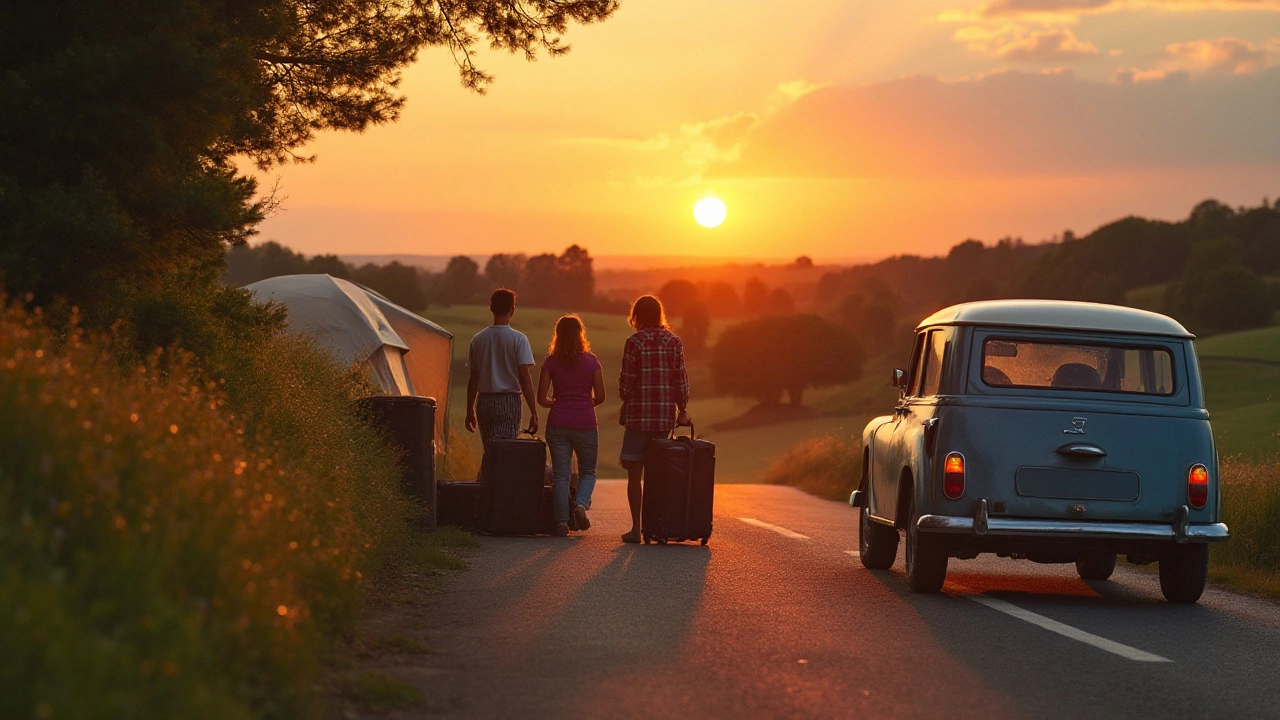Understanding the Real Cost of Attending Music Festivals
 Dec, 30 2024
Dec, 30 2024
Music festivals are more than just a series of performances; they're an experience that can take you away from the everyday and thrust you into a world full of sound, sights, and sensations. But before you get lost in the rhythm, it's important to know what goes into accessing this world of musical magic.
From snagging early bird tickets to navigating logistics like travel and lodging, there's a lot more to consider than just the lineup. With each festival having its own unique vibe and structure, understanding these elements can not only help you budget better but also enhance your overall experience.
So, whether it's your first festival or you're a seasoned attendee, knowing the financial ins and outs can help you focus on what really matters – the music, friends, and memories you make along the way.
Ticket Prices and Packages
Music festivals offer a spectrum of ticketing options, catering to all kinds of attendees. From general admission to exclusive VIP packages, understanding what you're paying for can significantly affect your festival experience. General admission tickets typically provide the basic entry to the festival grounds. They're often the most affordable option, ranging from $50 for smaller festivals to upwards of $400 for more popular events. However, prices aren't static. As festival dates approach, prices often soar, capitalizing on last-minute buyers.
VIP packages, on the other hand, are an enticing option for those looking for an elevated experience. These often include perks such as dedicated viewing areas, shorter lines, exclusive amenities, and sometimes, meet-and-greets with artists. Prices for these can vary widely depending on the festival, reaching up to $1,500 or more. It's crucial to check what's included in these packages, as the value can fluctuate significantly from festival to festival.
There are also festival tickets that offer multi-day passes, which can be great for comprehensive experiences without the hassle of purchasing daily tickets. Sometimes, festival-goers can choose camping packages, combining admission with camping facilities on site. These typically add a few hundred dollars to the ticket cost but eliminate the need for separate accommodation expenses. When planning, it's vital to consider if the cost of amenities matches your expectation. As seasoned festival-goers say, "Plan what you can afford, but indulge in what you love," because sometimes a few extra bucks for comfort can enhance the experience tenfold.
"Festivals are about community, and buying the right ticket is your pass into that world. Spend wisely, and your memories will be priceless." – Emma Johnson, Festival Expert
A lesser-known tip for securing better prices is to subscribe to the festival's newsletter or follow their social media channels. Often, early bird deals are released through these channels, offering dedicated fans a chance at snagging tickets at a reduced price. These deals can save you a significant amount of money, sometimes up to 30% off the regular ticket price. Thus, tapping into these resources ahead of time can be extremely beneficial for budget-conscious attendees.
| Ticket Type | Price Range | Benefits |
|---|---|---|
| General Admission | $50 - $400 | Access to festival grounds |
| VIP Packages | $300 - $1,500+ | Exclusive viewing areas, amenities |
| Multi-Day Pass | $200 - $700 | Multiple days entry |
| Camping Packages | $100 - $300+ | On-site camping |
In essence, when you're planning to attend a music festival, it’s important to consider your budget, the type of experience you crave, and the amenities that will enhance your journey. By understanding the diversity of ticket options and keeping an eye on available deals, you can make an informed choice that best fits your festival bucket list.

Travel and Accommodation
When it comes to attending a music festival, travel and accommodation decisions can significantly impact your overall experience and budget. Let's face it, securing a place to rest your head after a long day of revelry is just as important as getting a good view of the stage. Most festivals offer a range of options from camping on-site to staying in nearby hotels or even renting a house with friends. Each choice comes with its own set of logistics and costs, requiring careful consideration to balance convenience and expense.
On-site camping is often a popular choice for festival-goers, not only due to the affordability but also for the immersive experience it offers. Waking up to the distant rumble of soundchecks and brushing shoulders with fellow campers creates a sense of community that many find irresistible. However, this option also requires preparedness – think beyond just pitching a tent. Essentials might include portable chargers, coolers filled with snacks, and perhaps most importantly, a strategy for keeping yourself clean when showers and facilities are limited. A solid packer's list is key for ensuring comfort without breaking the bank.
If camping isn’t your style, looking into hotels or vacation rentals could be more your speed. This often means you’ll need to book well in advance, as festival weekends can make hotel rooms scarce and drive prices up. Sharing accommodations with friends can help mitigate costs significantly while adding to the fun and camaraderie of the festival weekend. On occasion, festival shuttle services are available, providing transportation between accommodations and the festival site, which can save both time and money on ride-shares or car rentals.
For those traveling from outside the city or even the country, transportation methods will vary from planes to trains to automobiles. Early booking is your ally here, as prices for flights and trains tend to rise as the event date approaches. Many festivals are equipped with robust infrastructure for handling an influx of visitors, offering shuttles or pickup services from major transit hubs to the festival ground. "The key is to be prepared, do your research, and be ready to adapt," says travel expert Karen Brady.
"It's all about figuring out what suits your lifestyle and your budget best."
Knowing the lay of the land, or at least getting acquainted with a festival's geography, can also be a helpful step in the planning process. Maps of the festival site and nearby accommodations often reveal nuggets of practical information like walking paths, public transport stops, and the locations of nearby convenience stores for last-minute necessities you might need to grab. Packing a pair of durable, comfortable shoes can't be overstated if you're walking between locations. Saving on unnecessary extra purchases and planning ahead for comforts will contribute significantly to a stress-free festival experience, right there alongside your favorite bands and artists.

On-site Expenses
Diving into a music festival environment can be enthralling but comes with its own set of costs that you need to manage wisely. Beyond just the ticket price, there are various expenses that can quickly add up during the festival. Food and drinks are a major aspect of the festival experience, where you might find yourself tempted by an array of gourmet food stalls and crafty cocktail bars. While these options provide convenience and a taste of local cuisine, they often come at a premium, especially when exclusive festival vendors are involved. It’s not uncommon for drinks to start at $10 each, and a simple meal can easily exceed $20. This makes budgeting for meals crucial, unless you plan to bring your picnic-style snacks, knowing that outside food policies can vary greatly by festival.
Merchandise and event memorabilia are another amenity that most festival goers enjoy. Whether it's an official festival T-shirt, a band poster, or quirky souvenirs, these items serve as a timeless reminder of the memorable moments spent in a sea of music lovers. While some merchandise may seem pricey at the time, it is often seen as a worthwhile splurge when comparing the emotional value it holds. However, it's wise to allocate a specific portion of your budget for merchandise to prevent impulsive purchases.
Festival experiences often extend beyond music, offering workshops, amusement rides, or even art installations, each of which might incur additional fees. These activities can enhance your time at the festival, providing unique stories and adventures, but they should be part of calculated expenditures. This especially holds true for festivals like Coachella or Glastonbury, known for their expansive art landscapes and experiences. Planning ahead for these attractions can ensure you enjoy them without regretting expenditure decisions later on.
Transportation within the festival grounds presents another potential expense. Large festival venues may offer shuttles or other means of transport to get from stages to camping areas, usually at an added cost. Alternatively, many attendees bring or rent bicycles or scooters to navigate large grounds, which although comes as an initial cost, saves time and energy during the event. Additionally, consider any parking fees if you're driving to the event, as these can vary widely from festival to festival.
Security and safety might not be expenses you have direct control over, but festival-goers should be aware of potential charges for storing belongings securely. Many festivals offer lockers to keep your valuables safe for a fee. While it can be tempting to keep everything on you for convenience, utilizing these facilities can provide peace of mind, particularly in the bustling environment where pick-pocketing can be a concern.
"According to an event planning study in 2023, on-site expenses typically account for up to 50% of a festival-goer's total expenditure. This highlights the importance of preparing a comprehensive budget," stated Eventbrite in their latest findings.
These aspects, often left to last-minute consideration, play a significant role in defining your festival experience. By estimating costs beforehand and keeping track of what you spend on-site, you can manage your festival budgeting more effectively to ensure you enjoy the festival to its fullest without financial stress.

Tips for Saving Money
Attending music festivals can be an exhilarating yet costly affair. However, with a bit of savvy planning, you can immerse yourself in the festivity without compromising your finances. One of the first considerations is purchasing tickets. Most festivals offer tiered pricing, with 'early bird' tickets being far more affordable. Mark your calendar for the ticket release dates and set notifications to grab these deals before they sell out. Additionally, many festivals run contests on social media where you can win free passes. Being active and participating in these events can pay off, sometimes in a big way. Remember that buying group tickets can often save money due to group discounts offered by festivals.
When it comes to travel and lodging, combining your festival trip with a small vacation is a clever strategy. Consider road-tripping with friends to reduce costs, splitting gas, toll, and parking fees. Finding affordable lodging can be tricky, but platforms like Airbnb or camping options near the festival grounds can provide budget-friendly choices. "It's remarkable how much you can save by planning your lodging and travel smartly," notes renowned festival expert, Mark Jennings.
"Sharing accommodations with fellow festival-goers isn’t just economical but also enhances the communal spirit of the festival experience."Planning in advance helps you avoid last-minute price spikes, allowing you to secure the best deals.
Once on-site, sticking to a budget is critical. Prepare yourself by scouting food and drink policies on the festival's official website. Many festivals allow you to bring sealed water bottles and snacks, helping you bypass pricey on-site meals. Consider investing in a hydration pack to keep you refreshed throughout the day. Food trucks often offer a range of inexpensive options, so breaking away from the festival grounds can lead you to hidden culinary gems nearby. Merchandise can be tempting, but keeping purchases to items that you'll cherish long-term, rather than impulse buys, is key. Load your festival wristband or card with a predetermined amount to ensure you don't overspend.
An essential tip for attending music festivals is forming connections with fellow attendees. Sharing resources with new friends can significantly cut costs, whether it's rides, meals, or campground essentials. Volunteering at festivals can also be a rewarding way to attend at a reduced rate or even for free. In exchange for a few hours of work, many festivals offer free admission, allowing you to soak up the atmosphere without denting your wallet. Moreover, some concerts offer discounts for students, members of the military, or locals, so be sure to inquire.
Finally, keeping an eye on resale sites like StubHub or TicketSwap can often yield last-minute deals on tickets if you're lucky. Just ensure to verify the authenticity of the tickets to avoid scams. For those who plan to experience an extravagant festival, budgeting well in advance is crucial. Saving incrementally for a few months can prepare you to fully enjoy the performances, art displays, and vibrant community without the stress of financial concerns. By using these tips, you can focus on creating memories rather than managing money. Participating in music festivals doesn’t have to break the bank when armed with foresight and practicality.